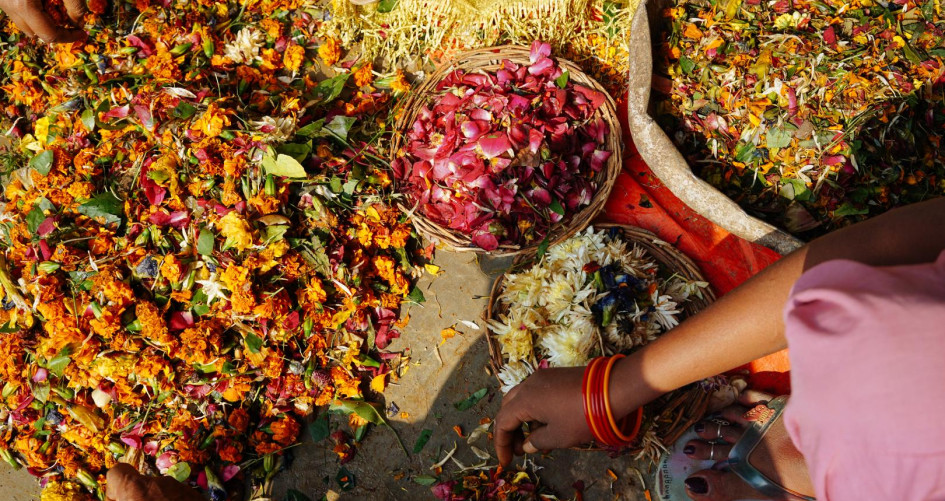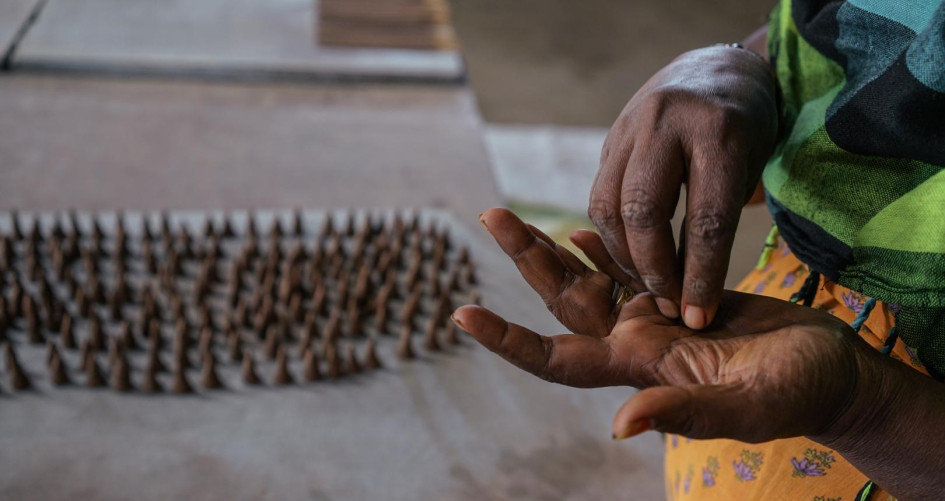Phool is doing its part to clean up the River Ganges by recycling flowers from temples and mosques. Over eight million tonnes of flowers are discarded in the river every year for religious purposes in South Asia. This is contributing to the pollution of the River Ganges, which provides drinking water for over 420 million people. Phool has come up with what it reports is “the world’s first profitable solution” to the monumental temple waste problem: flowercycling. Women working with Phool collect floral-waste daily from temples. The waste is up-cycled to produce organic fertilizers, natural incense, and biodegradable packaging material.
Key facts
- 11,060 metric tonnes of temple-waste has been flowercycled® to date;
- 110 metric tonnes of chemical pesticides that enter the river through temple waste have been offset;
- The income of 73 manual scavenger families has increased at least six-fold;
- 365 families have been impacted by Phool through increased living standards and stable incomes;
- 1,260 women have been supported through Phool to date;
- 19 children whose mothers used to work as manual scavengers have started going to school.
The problem
Across the country, people bring flowers to temples daily — gifts for the gods, blessings for life, for celebrations — to the tune of more than 800 million metric tonnes per year. These flowers are thrown into the Ganges and India’s other sacred rivers, a beautiful religious ritual that is having an unfortunate effect. As the flowers rot, they fill the rivers with waste, dumping toxins like arsenic, lead, and cadmium from pesticides, thus causing pollution and enormous levels of water-borne diseases.
Flowers, incense, and other religious items come in plastic packaging adorned with images of the gods. Devotees do not want to throw away this packaging, so they either leave the packaging under trees or immerse it into bodies of water.
The solution
Phool is solving the problem of flower and packaging waste. They have created a compostable packaging using seed paper infused with Tulsi, or holy basil, seeds, and ink made from vegetable dyes. After using the incense or flowers, all the user must do is unfold the paper, bury it in a pot with dirt, water it regularly, and watch the seeds sprout into a Tulsi plant.
A QR code on the pack sends users to a microsite, where they can share photos of their plant and get discounts on products.
Phool is dealing with flower waste by providing clean, safe jobs for manual workers. Because the flowers have been used for worship, they are seen as sacred and cannot be sent to a landfill. Phool works with local women to collect the flowers from the rivers and then upcycles them into compost and useful products such as incense sticks, soap, and vegan leather goods.
Helping the planet
Phool collects flowers directly from the rivers to create vermicompost called “Mitti”. “Mitti is a power-packed shot of mineral-rich nutrients and enzymes that energizes the soil. From its source to the end, ‘Mitti’ is made using natural processes, has zero carbon footprint, and remains free from all forms of chemicals and carcinogens.
Soon after launching Mitti, Phool expanded the product range to include incense sticks and cones made of flowers instead of the traditional coal.
Helping people
Phool's products are handcrafted by women who used to be manual scavengers. India’s 1.6 million manual scavengers collect human excreta from dry latrines and sewers daily, load it into cane baskets or metal troughs and carry it away on their heads for disposal at the outskirts of the settlement. For centuries, manual scavengers have dealt with massive social and health risks. There are about 4.5 million dry latrines in India where the human excreta are cleaned manually.
Now, these women are employed with Phool, earning over INR 7,000 per month. These women now have secure bank accounts, access to health insurance, clean drinking water, and toilets.
By 2021, Phool aims to provide livelihoods to 5,100 women and recycle 51 tonnes of temple waste daily.
Spillover effect
Phool can be easily replicated in any city. It currently works in four cities in Uttar Pradesh, with plans to expand to Bangladesh, and Nepal. New products are in the works (including a biodegradable Styrofoam alternative) and they are in talks with the government of India to scale up across the country.




Images owned by the activity partners, all rights reserved.





